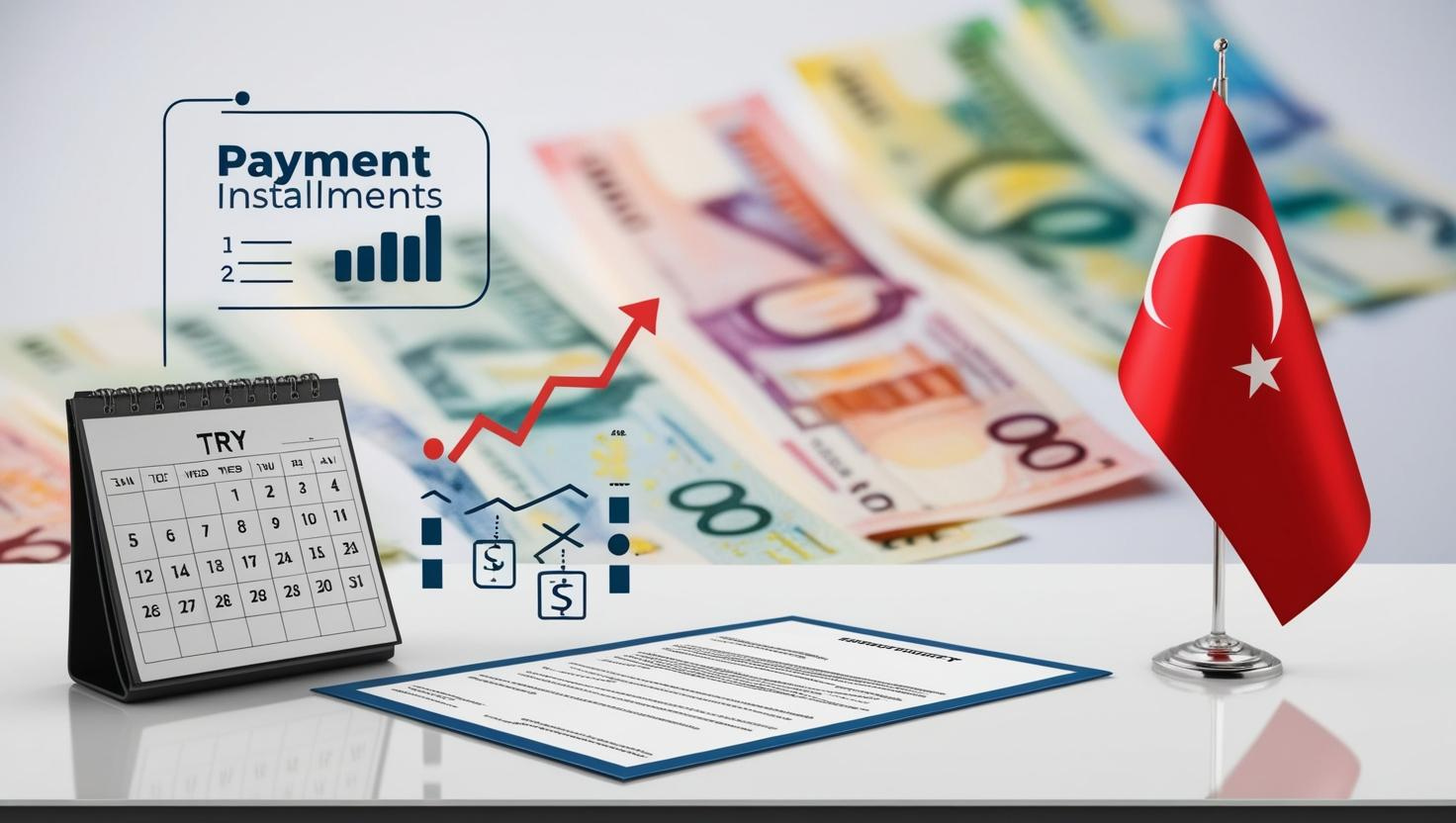Anúncios
Looking for a Loan with 12-Month Installments Requires Planning and a Good Understanding of Bank Conditions
Turkish banks offer this type of loan aiming for quick repayment and lower total costs.
Loans with 12-month payments, highlighting institutions operating in Turkey and the specifics of each bank. We will discuss advantages, risks, interest rates, early payment options, and tips for keeping your finances balanced.
Loans with Installment Payments
In the Turkish banking market, loans with a 12-month term have gained popularity as a short-term option for consumers and entrepreneurs looking to address specific issues or finance immediate projects without dragging out payments for several years. Generally, this type of credit is perfectly suited for moderate needs: urgent medical expenses, planned travel, paying off high-interest debts, small investments in work equipment, or covering unexpected family costs.
Why 12 Months?
Short Term: In one year, the customer can eliminate the financial commitment, reducing the risk of being tied to payments indefinitely.
Lower Total Cost: Longer loans tend to generate more interest over time. By shortening the term, the total amount paid decreases.
Budget Adjustment: If someone is confident they can accommodate a slightly higher monthly payment for 12 months, they may prefer this method to save on the overall cost.
Anúncios
However, it’s important to keep in mind that, due to the shorter term, the monthly installment is naturally higher, representing a considerable portion of the income, especially if the loan amount is significant. Therefore, good financial planning and comparing offers are essential to avoid jeopardizing monthly stability.
Several popular Turkish banks — Ziraat Bankası, Garanti BBVA, İş Bankası, Halkbank, and Akbank — offer loans with terms such as 12, 24, 36 months, or more, and many of them provide specific advantages for the 12-installment range, such as competitive interest rates in exchange for faster repayment. Next, we will examine the benefits of prioritizing a short term, the risks that come with this choice, and how each bank manages this type of loan.
Banks with 12-Month Loans
Accessible Conditions
The competition in the Turkish market makes most banking institutions offer lines for 12-month payments, adjusting interest rates based on the client’s profile and desired amount. Each bank caters to a specific audience and risk assessment style. Here, we present Ziraat Bankası, Garanti BBVA, İş Bankası, Halkbank, and Akbank.
Ziraat Bankası
How the Loan Works
Typically, Ziraat focuses on audiences such as civil servants, retirees, and farmers, but it also serves salaried individuals in general.
For those looking for a 12-month term, the bank offers fixed rates in most cases, ensuring stable installments from start to finish.
Key Conditions
• Amount: Dependent on the applicant’s income, but ranges from smaller amounts (a few thousand liras) to medium amounts (~50,000 liras).
• Release: If the client receives their salary at Ziraat, approval can take 24-48 hours.
Garanti BBVA
How the Loan Works
Garanti BBVA stands out for its digital integration: clients can use the app (Garanti BBVA Kredi Başvurusu) to apply for a 12-month loan without visiting agencies.
The analysis is automated, including credit score verification and payslip uploads.
Key Conditions
• The 12-month term is considered short-term credit, so the interest rate is usually competitive for profiles with verified income and a clean credit history.
• Fast approval and minimal bureaucracy for clients already receiving their salary at Garanti.
İş Bankası
How the Loan Works
İş Bank focuses on solutions for various profiles, from students to entrepreneurs, but requires proof of income sufficient to cover a high monthly installment over 12 months.
Fixed rates prevent surprises during repayment, but if the amount is high (e.g., over 50,000 liras), the monthly installment may be too high for the 12-month term.
Key Conditions
• Simplified documentation for account holders, sometimes waiving the need for a guarantor if the income can support the installment.
• Evaluation is completed in 2 to 5 days, and once approved, the amount is deposited into the client’s account.
Halkbank
How the Loan Works
Known for serving everyone from pensioners to informal workers with stable bank statements.
For a 12-month term, interest rates may be lower than for longer terms, as the bank reduces its risk over time.
Key Conditions
• It’s common for the monthly installment not to exceed 30% of the applicant’s income. If it does, the request may be denied or adjusted to a lower amount.
• If the applicant is a civil servant or an employee of a partner company, approval tends to be faster with differentiated interest rates.
Akbank
How the Loan Works
Akbank focuses on modernity and convenience, allowing applications via app or website, confirming details in just a few hours.
In 12 months, repayment is completed quickly, freeing the client from extended terms and reducing total interest.
Key Conditions
• The rate is based on the credit score and income, but for short terms, competitive interest rates are usually offered.
• In some cases, the bank offers seasonal campaigns, reducing credit opening fees for those who take loans in 12 installments.
Advantages of Short-Term Loans
Below, we list 8 advantages and explain each one to show why choosing a 12-month term can be a good strategy:
Lower Total Cost
° The shorter the term, the fewer interest accumulated. A 12-month loan results in a lower final amount paid compared to choosing 24 or 36 installments.
Quick Repayment
° In just one year, the client frees themselves from the financial commitment, regaining borrowing capacity for other projects.
Less Risk of Economic Fluctuations
° In environments with inflation or fluctuating interest rates, shortening the term helps avoid surprises in indexed contracts. Typically, the rate is fixed and applies for the entire period.
Easier Planning
° Stopping to think: “In 12 months, I’ll be free of this loan” simplifies budget management, with the security of stable installments (if the rate is fixed).
Good Credit Score Credibility
° Paying off debt in a short term and without delays strengthens your credit history, making future approvals easier.
Less Bureaucracy in Some Cases
° Banks feel safer lending over a shorter period since the risk of default is lower. There may be fewer documentation or guarantee requirements.
Less Dependence
° You don’t need to maintain a relationship with the bank for many years; after twelve installments, the commitment ends, without retaining credit limits or assets as collateral.
Possibility to Negotiate Lower Rates
° By showing the bank you want a shorter term, some managers may view this positively and offer lower interest rates, as the likelihood of default decreases over just one year.
Comparison of Interest Rates and Types of Lenders
When opting for a 12-month loan, one of the first concerns is the interest rates offered, which can vary significantly between banks and non-banking institutions (such as cooperatives or digital finance companies). In general, shorter terms lead to a lower nominal rate because the lender’s risk is limited to 12 installments, rather than 24 or 36. However, this is not an absolute rule: it all depends on the applicant’s profile, credit score, and whether they have a salary account or other products with the bank.
By comparing rates from banks such as Ziraat Bankası, Garanti BBVA, İş Bankası, Halkbank, and Akbank, it’s possible to see annual fluctuations between 15% and 25%, depending on Turkey’s economic scenario and the client’s rating. Non-banking institutions or fintechs, for example, may offer faster approval but with slightly higher interest rates. Traditional banks often require more robust income verification but can offer better terms if the risk is low. In this sense, planning and comparing (doing several simulations) is the safest approach, allowing you to find the best balance between the monthly installment and the total effective cost (CET). An additional tip is to pay attention to mandatory insurance charges or credit opening fees, as they also affect the final amount to be paid.
Comparative Table of Interest Rates
12-Month Loans
| Bank | Interest Rate Range (Example) | Notes |
|---|---|---|
| Ziraat Bankası | ~15-20% p.a. | Frequently applicable to public servants, fixed rates for 12 months |
| Garanti BBVA | ~16-22% p.a. | Digital and fast analysis, good for account holders via Garanti BBVA Kredi Başvurusu |
| İş Bankası | ~15-21% p.a. | Terms from 12 to 48 months; 12 months have high installments, but moderate interest rates |
| Halkbank | ~15-20% p.a. | Encourages pensioners and public employees, may require less documentation |
| Akbank | ~17-25% p.a. | Focused on digitalization and fast decisions, fixed or flexible installments |
(Note: These figures are purely illustrative and may change according to each bank’s internal policy and market conditions.)
Rates and Points
• The spread (difference between the basic and applied interest rate) tends to be lower for those who already receive their salary at the bank.
• The range (e.g., 15%-25%) reflects profiles from low to high risk. A self-employed person without a history may fall into higher ranges, while a well-rated public servant may secure the lowest rates.

Early Repayment and Flexibility
Taking out a 12-month loan does not mean being completely “locked in” throughout that period. Many Turkish banks offer options for early repayment or other flexibility mechanisms.
Early Repayment
Full Settlement
° The customer can choose to pay off the entire remaining balance at once, reducing the amount of future interest.
° Generally, the bank charges only a small administrative fee or, in some cases, no additional fees at all.
Partial Repayment
° Instead of paying off the entire loan, the borrower can make advance payments, shortening the term or reducing the subsequent monthly amount.
° It is necessary to check if the contract allows choosing which approach (reduce payments or shorten the term).
Flexibility in the Agreement
Renegotiation
° If there is a sudden change in the customer’s income, it is possible to renegotiate the debt, changing the installments. However, this implies a cost analysis.
Specific Agreements
° In times of crisis, banks sometimes launch temporary campaigns that allow rescheduling debts without major penalties.
Temporary Suspension
° Although uncommon, some products offer a pause of 1 or 2 installments per year, but with an additional cost.
° This flexibility ensures that, even though the term is short, the borrower does not have to face a complete lack of alternatives in case of unexpected eve
Can an Unsecured 12-Month Loan Have Very High Interest Rates?
Opting for a 12-month loan without providing any real collateral (such as property or a vehicle) or guarantors can indeed result in higher interest rates in the Turkish market. This is because the bank assumes greater risk of default when there are no assets or people responsible for the potential non-payment. In contrast, the customer gains more freedom, without tying up assets to the contract, and completes the repayment in just one year.
To counterbalance this potentially high cost, it is essential to present a good credit history, demonstrate income stability, and, if possible, maintain a prior relationship with the institution. For example, those who receive a monthly salary from the same bank or have previously paid off loans on time tend to receive more competitive offers. Still, each case is evaluated individually: while someone with a high credit score and solid pay stubs may access reasonable interest rates, someone with informal income or a weak history may face significantly higher rates. Therefore, comparing quotes from different banks (Ziraat, Garanti BBVA, İş Bank, Halkbank, Akbank) and running simulations with different terms and amounts helps balance the absence of collateral with an interest rate percentage that doesn’t make monthly payments unmanageable. In some cases, even without collateral, rates can be attractive if the customer has reliable pay stubs and a positive banking relationship.
Payment Conditions
When discussing payment conditions for 12-month loans, there are some relevant dimensions:
Monthly Due Date
Payment Date
° The customer chooses a specific day, such as the 5th or 10th of the month, to align with their salary or pension payment.
° Banks can adjust the date according to the applicant’s convenience.
Payroll Deduction
° Some products allow for payroll deduction, where the installment is directly deducted from the customer’s payment, reducing delays.
Installment Size
Installment Calculation
° Typically, the fixed interest rate is multiplied by the principal and divided over 12 months.
° If the amount is significant (e.g., 50,000 or 100,000 TL), the monthly installment may impact the budget.
Payment Method
° Automatic debit from the checking account or manual payment via a slip, depending on the bank’s policy.
° Customers who opt for automatic debit are less likely to forget the payment date, avoiding delays and fines.
Renegotiation
Adjustment
° If unforeseen circumstances arise, some banks may renegotiate the loan to 24 months, but this will incur new interest and administrative fees.
Debt Transfer
° In some cases, if another bank offers a better rate, the customer can settle the debt with the original bank and start paying in installments with the new bank, though this requires a cost-benefit analysis.
Challenges and Precautions
Taking out a 12-month loan for the desired amount is advantageous due to the quick repayment, but it also presents risks if there is no proper planning. Below are some essential points:
Higher Monthly Installments
In such a short term, the monthly payment for each installment is higher. If the loan amount is large (e.g., 50,000 to 100,000 TL), the installment could put pressure on the budget, requiring financial discipline.
Risk of Default
Without proper planning, the significant sum of installments can lead to delays. Each delay results in penalties and potentially negative impacts on the credit score, compromising access to future financing.
Market Conditions
Turkey, at certain times, faces inflation and fluctuations in interest rates. If you take out a 12-month loan during a period of high interest rates, consider whether there is an expectation of a decrease in the next semester. On the other hand, the advantage of a short period is not being exposed to fluctuations for too long.
If the consumer combines caution with a thorough review of the contract, the chances of enjoying a 12-month loan with peace of mind increase. However, being negligent can lead to cash flow problems and even result in default.
Summary of Benefits
• Quick Repayment: In 12 months, the client settles the loan, reducing long-term exposure. • Lower Interest Accumulation: Compared to longer terms, the total cost is lower. • Budget Control: By setting a fixed monthly installment for just one year, planning becomes easier. • Possibility of Early Payment: Almost all banks allow early repayment, reducing interest. • Less Risk of Economic Fluctuation: The short term avoids surprises if market rates rise. • Higher Approval Chances: Institutions may approve more easily, as the likelihood of default within 12 months is theoretically lower. • Different Options: Banks like Ziraat, Garanti BBVA, İş Bank, Halkbank, and Akbank adapt the 12-month loan to specific needs. • Strategy for Old Debts: Using a 12-month loan to replace expensive debts can result in savings if the rate is lower than the current liabilities.
Frequently Asked Updated Questions
1. How do I decide if it’s better to pay in 12 months or extend to 24/36 months?
It depends on your budget. If your income allows for higher installments without sacrificing basic expenses, 12 months saves on interest. Otherwise, a longer term helps reduce the monthly installment, even though it results in more interest overall.
2. Can businesses use this 12-month option for working capital?
Yes. Many institutions offer short-term credit for businesses that need immediate liquidity. However, the business must plan its cash flow to cover the higher monthly payments.
3. What happens if I want to refinance the loan before the end of 12 months?
It is almost always possible, but the bank will recalculate the interest and may charge a re-contracting fee. If the intention is simply to repay early, it is usually more advantageous, as it reduces future interest.
4. Is there a discount on interest if I offer collateral, even for a 12-month loan?
In some banks, yes. If you offer property or a vehicle as collateral, there is a chance for lower interest rates. However, for such short terms, many prefer not to complicate the operation with collateral.
5. Can I include life insurance or unemployment insurance in the contract, even for loans of just 12 months?
Typically, yes. Many banks offer insurance packages that cover part or all of the installments in case of death, disability, or involuntary dismissal, even for short-term loans. Check if the additional cost is worthwhile.
For those seeking a loan with quick repayment, choosing a 12-month term may be the ideal solution, especially in a scenario like Turkey, where interest rates and inflation can fluctuate. Although the monthly payment is naturally higher compared to longer terms, the advantage is clearing the debt within one year, reducing interest accumulation, and freeing yourself from prolonged financial obligations. Furthermore, the option of a short-term loan highlights a more restrictive budget plan, preventing the borrower from becoming overwhelmed with payments that drag on for several years.
Banks like Ziraat Bankası, Garanti BBVA, İş Bankası, Halkbank, and Akbank stand out in this market, offering lines suitable for average amounts (which can range from 5,000 to 100,000 or more) and facilitating approval when the client’s documentation and income are satisfactory. Even so, each institution adjusts its rates according to the applicant’s profile. Those with a good credit history (no protests or delays) and who receive a salary at the respective institution may have advantageous conditions, with interest rates close to the minimum applicable during the period.
Another relevant aspect is the possibility of early repayment or partial amortization, which further reduces the total cost of interest. However, it is crucial to exercise caution when choosing a 12-month loan: large installments require discipline to avoid compromising essential daily expenses. Before signing, it is worth comparing simulations, checking the effective total cost (CET), and carefully reading the clauses regarding fines or late fees. Thus, if the goal is to solve an immediate financial problem, acquire a moderately priced asset, or consolidate debts under better conditions, 12-month loans emerge as an effective alternative, as long as they are paired with responsible planning and a clear strategy for settlement within that limited period.



